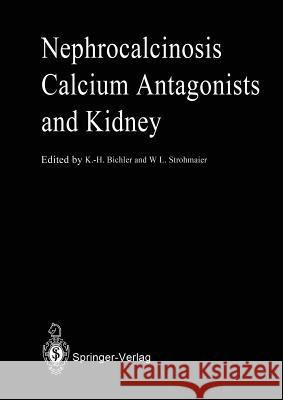Nephrocalcinosis Calcium Antagonists and Kidney » książka
Nephrocalcinosis Calcium Antagonists and Kidney
ISBN-13: 9783642728594 / Angielski / Miękka / 2012 / 190 str.
The effect of calcium antagonists on heart muscle and blood circulation is the reason that they have found widespread clinical application for a number of years. Less well known, in contrast, is the effect this group of substances has on the kidneys, both on kidney cells and the blood flow through the kidneys. This effect was the subject of a workshop we organized in Tiibingen in June 1986. Different groups studied the effects of these substances, especially in animals, on the processing of calcium by the kidney cells and on blood flow. A possible explanation is that the calcium antagonists block the influx of calcium through special cell canals, especially the cells of the distal tubule. It is necessary to test whether there is a blockade or only a reduction in the passage of calcium. Our understanding of the effect of calcium antagonists is in large part based on the results of morphologic, physiologic, and pharmacologic studies of calcium in the kidneys. The particular processes involved in nephrocalcinosis are special objects of study with regard to calcium antagonists. This book presents the results of experimental studies of the effect of calcium antagonists on nephrocalcinosis and acute renal failure after ischemia. In this context, the clinician is particularly interested in the use of calcium antagonists to protect against the kidney in urolithiasis, in acute renal failure and during kidney transplantation. The book is thus of interest to urologists and nephrologists as well as pharmacologists. biochemists, physiologists, and others in research.











